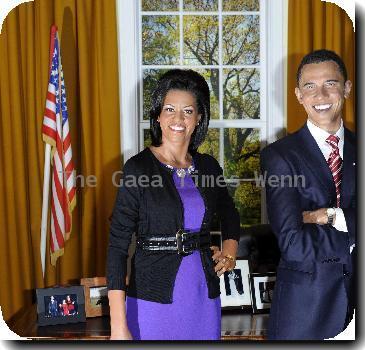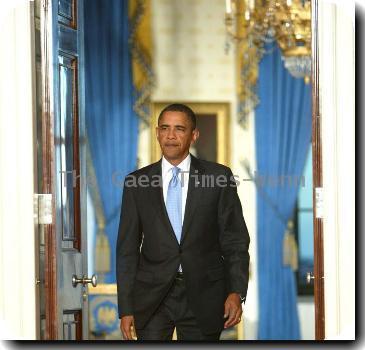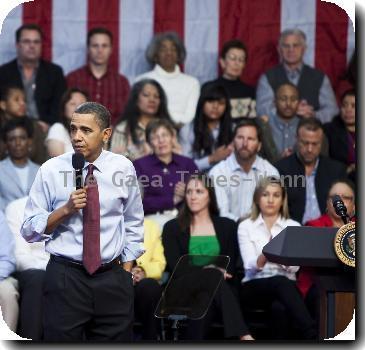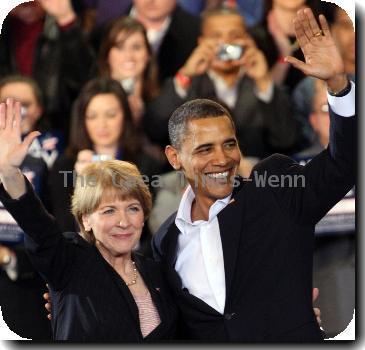Afghan leader, NATO officials meet tribal leaders in Kandahar to reassure them about offensive
By Christopher Bodeen, APSunday, April 4, 2010
Karzai, US general meet with Afghan tribal leaders
KABUL — Afghan President Hamid Karzai and the commander of U.S. forces sought support from tribal leaders Sunday in the volatile south, where trepidation is rising over a planned offensive against entrenched Taliban forces.
The meeting comes amid tensions with Washington over Karzai’s scathing accusations of foreign interference in last year’s elections that threaten to derail his main foreign backer’s trust in his leadership.
Karzai attempted to contain the damage with a telephone conversation Saturday with Secretary of State Hillary Rodham Clinton, but his allegations laid bare the growing frostiness in relations as the United States and NATO ramp up troop levels to try to turn back the Taliban.
Karzai and Gen. Stanley McChrystal flew together early Sunday to the southern city of Kandahar to meet with scores of tribal elders as part of efforts to build political support ahead of the upcoming military push.
Most of the 30,000 new troops promised by President Barack Obama will be headed to Kandahar city and the surrounding province.
Speaking to the gathering, held under tight security at the governor’s compound, Karzai said he knew people in the area were fearful of the coming offensive.
He pledged to discuss tribal leaders’ concerns with them and said the military action would be “an operation to bring security.”
Also present at the meeting, known as a shura, was the president’s younger brother, Ahmad Wali Karzai, a high-ranking Kandahar official and key source of support in the south, despite having been publicly accused of being a major drug lord — part of the corruption and cronyism that undermines support for the government and drives Afghans to the Taliban. He denies any involvement in drugs.
Mark Sedwill, NATO’s current senior civilian representative, also attended as a part of his mandate to lead efforts to “find a political solution and promote stabilization” in Kandahar, spokesman Christopher Chambers said.
McChrystal did not address the gathering, but has said he foresees a series of targeted actions in Kandahar to steadily drive out the Taliban, rather than the D-Day style assault launched in Marjah in neighboring Helmand province.
After eight years in power, the central government’s writ counts for little outside the capital of Kabul, especially in the south from which the Taliban emerged as a political and military force in the 1990s. While part of that is fed by tribal rivalries, much anger is also directed at Kabul for the failure to bring security and basic services such as electricity and running water.
Sayed Ziarbaksh, a Kandahar official attending the shura, said the expected NATO offensive would only be effective if it left permanent institutions behind in the Taliban’s spiritual homeland.
“If (troops) just come and go, it may not be worthwhile,” Ziarbaksh said. “If there is no government, then there will be Taliban in those places.”
Despite its importance, the Kandahar visit risks being overshadowed by the fallout from Karzai’s Thursday remarks, which the White House described as troubling.
Karzai lashed out against the U.N. and the international community, accusing them of perpetrating a “vast fraud” in last year’s presidential polls as part of a conspiracy to deny him re-election or tarnish his victory.
A U.N.-backed watchdog threw out nearly a third of Karzai’s votes in the Aug. 20 ballot, forcing him into a runoff.
The tone of Karzai’s remarks reflected the strain in his relations with the Obama administration, which has been far more critical of his stewardship than former President George W. Bush — especially his failure to curb corruption and improve governance.
Partly in response, Karzai this month gave an anti-corruption body powers to prosecute cases in court.
His attorney general also opened an investigation into the former head of the Ministry of Hajj and Mosque, Sediq Chakari, who is implicated in the disappearance of travel funds for last year’s annual pilgrimage to Mecca. Ministry of Interior spokesman Zemeri Bashary said Sunday that the ministry formally asked Interpol less than a week ago to arrest Chakari, who is living abroad.
Meanwhile, three Afghan police were killed and three wounded on Sunday when their vehicle came under attack near Helmand’s capital of Lashkar Gah.
That followed German troops’ mistaken killing Friday night of six Afghan soldiers.
German Chancellor Angela Merkel called Karzai on Saturday to express her condolences over the deaths, while Karzai expressed sympathy for the deaths of three German soldiers in fighting the same day.
German forces were sharply criticized last September when they ordered an airstrike on two tanker trucks that had been captured by the Taliban. Up to 142 people died, many of them civilians.
Tags: Afghanistan, As-afghanistan, Asia, Barack Obama, Central Asia, District Of Columbia, Europe, Germany, Kabul, Kandahar, North America, United States, Western Europe



